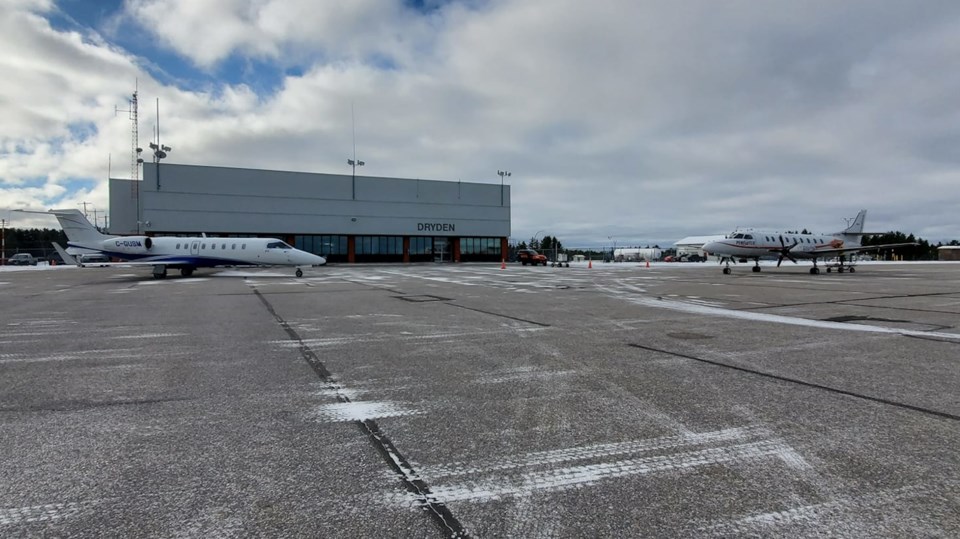Treasury Metals president-CEO Jeremy Wyeth is admittedly “not happy” that Perimeter Aviation, the parent company of Bearskin Airlines, will be dropping regularly scheduled passenger service to Dryden in May.
His mine development company is in the planning stages of building the open-pit Goliath gold mine, just east of the community.
Treasury will be making a decision likely in early 2025 to begin construction. That will mean a flood of outside contractors coming and going over a two-year development window.
Goliath is the leading project in the Dryden area, an emerging gold and lithium mining camp in northwestern Ontario.
But the optimism for the near future hasn’t translated into butts in the seats, prompting Winnipeg-based Perimeter to terminate scheduled service to Dryden, Kenora and Fort Frances come May 11, citing declining ridership.
Unlike the extensive airlift operations at the Victor diamond mine in the remote and harsh James Bay region, whose construction Wyeth oversaw in the late 2000s, Goliath is just 20 kilometres east of the City of Dryden and not far off the Trans-Canada Highway.
As much of an emphasis that Treasury is making on hiring locals, Wyeth said there’s not enough skilled labour in the area to meet their anticipated demand.
Many hundreds will be employed during the construction phase followed by some 300 mining positions when gold production starts in 2026. A good portion of the workforce will be flown in on a rotational basis.
The Dryden Airport is only a 10-minute drive from the Goliath site. But that vital bit of public infrastructure means nothing for Treasury if there’s no regularly scheduled service.
Arranging chartered flights into Dryden would be a “last resort,” Wyeth said.
Delivering full plane-loads of contractors and miners doesn’t do much to help the community they’re partnering with, he said.
Treasury has been working closely with the City of Dryden to address a shortage of housing to accommodate the anticipated influx of newcomers to town.
And the loss of such a local amenity, in scheduled air service, would hamper their recruiting efforts to convince miners and their families to relocate to the community of 7,400, a four-hour drive west of Thunder Bay.
“If you’re saying to people, this is a great place to stay but if you want to go anywhere it’ll take you a day to get there, people may say, I’ll leave my family in Thunder Bay and you fly me in and out.”
Treasury is working with the City of Dryden in formulating a plan to provide letters of support and helping craft a proposal to land an alternative air carrier that serves everyone’s interest.
They’re hoping the search process delivers a carrier that can provide better service for all.
Wyeth isn’t too pleased with Bearskin’s existing service, believing the region deserves better.
“Right now the flights that have been running are not that regular, not that reliable.”
Want to read more stories about business in the North? Subscribe to our newsletter.
Wyeth also took issue with Bearskin's airfares.
To commercially fly a construction and mining workforce into Dryden would impact their bottom-line operating costs, which will influence the longevity of the life of the mine, Wyeth said.
“For CEOs running these companies, we want to put as much money as we can into developing the project, not into logistics.”
Wyeth admits he doesn’t use the existing air service.
In flying from Toronto to Thunder Bay within a couple of hours, Wyeth said, Bearskin’s current schedule doesn’t match up well in getting to Dryden in a timely fashion. It translates to a full day of travel.
“To get three days on site takes me five days.”
Instead, he and others opt for the highway to make the lengthy and sometimes treacherous drive west from Thunder Bay on the Trans-Canada.
“For me, the solution is find a reliable, regular and affordable carrier,” said Wyeth.
Together with Dryden Mayor Jack Harrison and CAO Roger Nesbitt, they hope to determine who is driving versus flying, determine what size of plane might work best on that route, and maybe poll other area mining and exploration companies to provide a business case, and some degree of certainty on ridership numbers, to present to a replacement carrier.
“That’s the types of discussions we’re having at the moment,” said Wyeth.
“It can be a win-win. If you find a carrier that makes a decent profit out of running the services without it being exorbitantly expensive, we’ll find the people to use those flights.”
The nearby Sioux Lookout airport has done well from a travel and logistics standpoint of creating a service hub to serve dozens of remote First Nation communities to the North.
Dryden’s airport can do the same for the mining industry, Wyeth said, and that would increase the frequency of flights.
Wyeth said he’ll be huddling with Nesbitt this week in Toronto where the CAO will be attending the ROMA (Rural Ontario Municipal Association) conference.
The City of Dryden appears to have reached the point of no return on trying to coax Perimeter to restore service. The municipality said planning is underway to contact other carriers and senior levels of government on restoring service to their impacted community and others in the northwest.
In an email, Nesbitt said he was driving to Thunder Bay and flying out to Toronto for the conference, as Bearskin’s scheduled service doesn’t work for him either.
“At this time, Dryden is not planning to engage Perimeter on reinstating the status quo passenger service Bearskin has been providing,” Nesbitt said.
“The way the current service is structured and being delivered clearly doesn’t serve the needs of area businesses and residents, hence the low demand.
“We have engaged many of our area stakeholders on this matter and there is indeed demand for a cost-effective, reliable, and convenient scheduled passenger service at the Dryden Regional Airport. The municipality and their partners we will be striving to bring that service to our community.”




